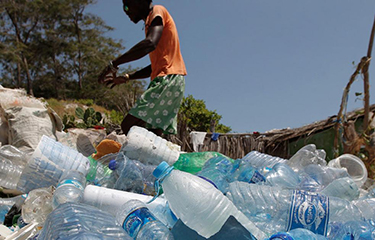Four countries are upping their engagement in the fight against marine litter and plastic pollution by teaming with the United Nations Environment Program (UNEP) to organize a ministerial conference on preserving the oceans through the sustainable production and consumption of plastics.
Germany, Vietnam, Ecuador, and Ghana are organizing the ministerial conference, to be held in September 2021, in line with a decision made during the first session of the fifth United Nations Environment Assembly (UNEA-5) – held virtually between 22 and 23 February – as the push for a common position on marine litter and plastic pollution intensifies among global community members.
“Momentum and visibility towards a global agreement, particularly in this Decade of Ocean Science for Sustainability, will be a good impetus to generate evidence around the impact of microplastics being found in our food chain and marine life,” Ecuador Environment and Water Minister Marcelo Mata Guerrero said in a press release.
The conference will be centered on giving the global community the opportunity to set specific and measureable goals on ending the problem of marine litter, which has had a broad impact on marine ecosystems, wildlife, and human health. A central goal of the conference is to achieve guidance on addressing the entire life-cycle of plastics and creating measures to achieve sustainable production and consumption of plastics that uses science-based approaches to monitor the process.
UNEP said the conference's organizers have also set the goals of creating funding source to support clean-up operations and mitigation measures and to create a conducive environment for developing “a framework and impetus for action and change at local, national, regional, and international levels.”
Separately, the World Aquaculture Society (WAS) and IMarEST have been coordinating a series of roundtable discussions "to exchange information pertaining to the risks associated with plastics in aquaculture” in the build-up to the second World Aquaculture Meeting 2020 event – taking placein Singapore 14 to 18 June, 2021.
The roundtables will be attended by organizations representing stakeholder groups that included academia, feed and feed additive manufacturers, testing and inspection organizations, NGOs, and farmers' associations, UNEP said.
Nearly 80 percent of plastic debris found in the oceans stems from land-based sources, though fishing gear is a recognized source of some plastic pollution, according to the U.N. Food and Agriculture Organization.
“The aquaculture sector is having to cope with production and management of plastic waste, in addition to the implications that plastic pollution may have on wild stocks and potential health risks from harvested products,” WAS said. “The continued growth of aquaculture highlights the need to address life-cycle management of equipment and waste management.”
In their joint statement, Ghana, Germany, Vietnam, and Ecuador said eliminating plastic waste is an easy way to achieve greater food safety and quality, thereby improving human health, benefiting coastal tourism, and combating climate change.
An organization being looked to as an example of leadership in the marine plastics arena is the Global Plastic Action Partnership (GPAP), founded two years ago by the World Economic Forum. GPAP, which is supported by Canada, the United Kingdom, Coca Cola, Dow, Pepsi, and Nestle, supported Ghana in the creating of the country’s National Plastics Action Partnership “to support the development of a circular economy framework as the primary vehicle for reducing plastic waste and plastics pollution.”
“We need innovation, cooperation, and financing in waste management and the monitoring of marine litter, especially in developing countries that lack infrastructure and where the process is harder and more difficult to pay for,” Ghana Environment, Science, Technology, and Innovation Minister Kwaku Afriyie said.
Germany has also taken a leading role in developing an action plan to combat plastic marine pollution, while Vietnam has embraced a development strategy to promote the maritime economy in parallel with protecting maritime environments and ecosystems as part of its 2030 national objectives.
“There is no single silver bullet to end marine litter and plastic pollution, but there surely is a toolbox to tailor solutions from,” German State Secretary at the Federal Ministry for the Environment, Nature Conservation, and Nuclear Safety Jochen Flasbarth said.
According to Ta Dinh Thi, the director-general of the Vietnam Administration of Seas and Islands – Vietnam is supporting a unified approach to combating marine plastics through development of “a cohesive global framework – with clear milestones, stakeholder roles and responsibilities, and progress indicators – to tackle transboundary marine litter and plastic pollution issues.”
And last year, Ecuador enacted a law for the rationalization, reuse, and recycling of plastics, and prohibited single-use plastics in commerce.
For the planned ministerial conference, UNEP will provide support for the four countries “to provide the best science to inform policy ahead of the reconvening of UNEA 5 in early 2022.”
“We simply must take urgent and transformational action now to put the brakes on plastic pollution because we cannot afford to reach the point of no return,” UNEP Executive Director Inger Andersen said.
Photo courtesy of the United Nations Environment Programme







